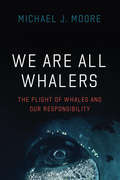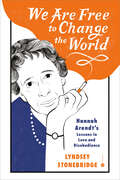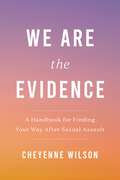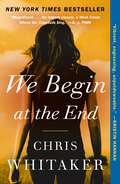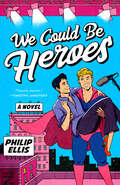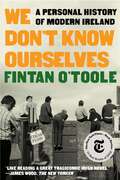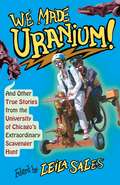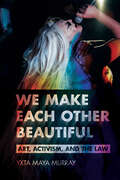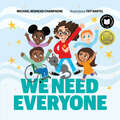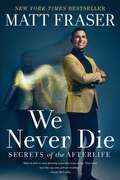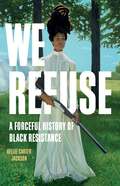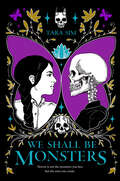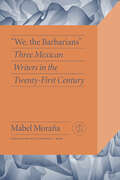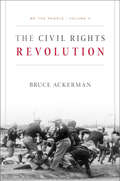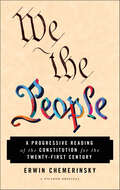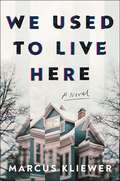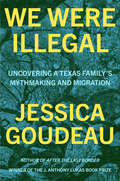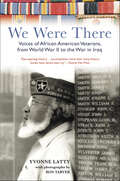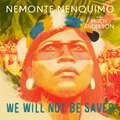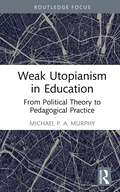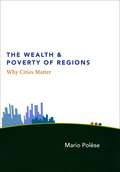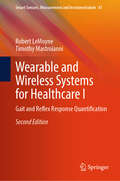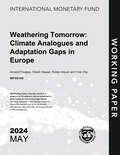- Table View
- List View
We Are All Whalers: The Plight of Whales and Our Responsibility
by Michael J. MooreRelating his experiences caring for endangered whales, a veterinarian and marine scientist shows we can all share in the salvation of these imperiled animals.The image most of us have of whalers includes harpoons and intentional trauma. Yet eating commercially caught seafood leads to whales’ entanglement and slow death in rope and nets, and the global shipping routes that bring us readily available goods often lead to death by collision. We—all of us—are whalers, marine scientist and veterinarian Michael J. Moore contends. But we do not have to be.Drawing on over forty years of fieldwork with humpback, pilot, fin, and, in particular, North Atlantic right whales—a species whose population has declined more than 20 percent since 2017—Moore takes us with him as he performs whale necropsies on animals stranded on beaches, in his independent research alongside whalers using explosive harpoons, and as he tracks injured whales to deliver sedatives. The whales’ plight is a complex, confounding, and disturbing one. We learn of existing but poorly enforced conservation laws and of perennial (and often failed) efforts to balance the push for fisheries profit versus the protection of endangered species caught by accident.But despite these challenges, Moore’s tale is an optimistic one. He shows us how technologies for ropeless fishing and the acoustic tracking of whale migrations make a dramatic difference. And he looks ahead with hope as our growing understanding of these extraordinary creatures fuels an ever-stronger drive for change.For more information on Moore’s book and research, please visit his webpage at the Woods Hole Oceanographic Institution.
We Are Free to Change the World: Hannah Arendt's Lessons in Love and Disobedience
by Lyndsey StonebridgeA timely guide on how to live—and think—through the challenges of our century drawn from the life and thought of political theorist Hannah Arendt, one of the twentieth century&’s foremost opponents of totalitarianism&“We are free to change the world and to start something new in it.&”—Hannah ArendtThe violent unease of today&’s world would have been familiar to Hannah Arendt. Tyranny, occupation, disenchantment, post-truth politics, conspiracy theories, racism, mass migration: She lived through them all.Born in the first decade of the last century, she escaped fascist Europe to make a new life for herself in America, where she became one of its most influential—and controversial—public intellectuals. She wrote about power and terror, exile and love, and above all, about freedom. Questioning—thinking—was her first defense against tyranny. She advocated a politics of action and plurality, courage and, when necessary, disobedience.We Are Free to Change the World is a book about the Arendt we need for the twenty-first century. It tells us how and why Arendt came to think the way she did, and how to think when our own politics goes off the rails. Both a guide to Arendt&’s life and work, and its dialogue with our troubled present, We Are Free to Change the World is an urgent call for us to think, as Hannah Arendt did—unflinchingly, lovingly, and defiantly—through our own unpredictable times.
We Are the Evidence: A Handbook for Finding Your Way After Sexual Assault
by Cheyenne WilsonA necessary, reassuring guide for all sexual assault survivors in need of immediate emotional and legal support post assault, and in the months and years after.We Are the Evidence is the first comprehensive resource for survivors of sexual assault. Written with conviction and compassion by Cheyenne Wilson, a registered nurse and survivor of sexual assault, this handbook contains everything victims and advocates need to know to navigate the tumultuous times that follow an assault. Within, there's advice for: The appropriate steps to take immediately after an assault Disclosing your assault how and when you choose How to pursue justice and navigate the legal system Beginning the healing process and reclaiming your power Throughout, you'll find exercises, opportunities to rest, and invaluable guidance from experts like attorneys, detectives and therapists. Voices from other sexual assault survivors also lend their support. Meant to be easily accessible, everything is organized for you to go right to the topic you most need guidance for, no matter where you are on your healing journey. You deserve to be heard, believed, and supported.
We Begin at the End
by Chris WhitakerWinner of the Gold Dagger for Best Crime Novel from the Crime Writers’ Association (UK)Winner for Best International Crime Fiction from Australian Crime Writers AssociationAn Instant New York Times Bestseller“A vibrant, engrossing, unputdownable thriller that packs a serious emotional punch. One of those rare books that surprise you along the way and then linger in your mind long after you have finished it.”—Kristin Hannah, #1 New York Times bestselling author of The Nightingale and The Four WindsRight. Wrong. Life is lived somewhere in between.Duchess Day Radley is a thirteen-year-old self-proclaimed outlaw. Rules are for other people. She is the fierce protector of her five-year-old brother, Robin, and the parent to her mother, Star, a single mom incapable of taking care of herself, let alone her two kids.Walk has never left the coastal California town where he and Star grew up. He may have become the chief of police, but he’s still trying to heal the old wound of having given the testimony that sent his best friend, Vincent King, to prison decades before. And he's in overdrive protecting Duchess and her brother.Now, thirty years later, Vincent is being released. And Duchess and Walk must face the trouble that comes with his return. We Begin at the End is an extraordinary novel about two kinds of families—the ones we are born into and the ones we create.
We Came Here to Shine: A Novel
by Susie Orman SchnallSet at the iconic 1939 New York World’s Fair, Susie Orman Schnall's We Came Here to Shine is historical fiction featuring two bold and ambitious women who navigate a world of possibility and find out what they're truly made of during a glorious summer of spectacle and potential.“An ode to female friendship that pulses with momentum and left me breathless.” —Fiona Davis, national bestselling author of The Chelsea Girls“A remarkable novel about the challenges women face and the courage they must summon in order to lead the lives they deserve." —Lynda Cohen Loigman, author of The Two-Family HouseGorgeous Vivi is the star of the Aquacade synchronized swimming spectacular and plucky Max is a journalist for the fair's daily paper. Both are striving to make their way in a world where men try to control their actions and where secrets are closely kept. But when Vivi and Max become friends and their personal and professional prospects are put in jeopardy, they team up to help each other succeed and to realize their dreams during the most meaningful summer of their lives. Perfect for fans of Taylor Jenkins Reid and Beatriz Williams, We Came Here to Shine is a story of ambition, friendship, and persistence with a fascinating behind-the-scenes look at the extraordinary NY World's Fair.
We Could Be Heroes
by Philip EllisNot all heroes wear capes. Some wear high heels and a wig.Patrick's acting career is on the rise, and the superhero movie he's filming might put him on the map . . . if the endless reshoots ever stop. Meanwhile, Will, a secondhand bookseller and part-time drag queen, is just trying to live his best life. After a chance encounter on a particularly chaotic night, a curious friendship sparks between the two men.At least, that&’s what they tell each other. Sure, Patrick finds Will captivatingly hilarious, and Will can&’t help but keep thinking about who is really behind the perfect mask Patrick shows the rest of the world, but nothing could ever really happen, right? Superheroes don&’t date drag queens, after all.When reality crashes into the fantasy world they&’ve built together, Will has to make a choice between the man of his dreams and being true to himself. Can Patrick be the hero Will&’s been waiting for, or will Will be the one to save Patrick after all? Uproarious and touching, We Could Be Heroes is an ode to queer joy and a romance that just might save the world.
We Don't Know Ourselves: A Personal History of Modern Ireland
by Fintan O'TooleNEW YORK TIMES BESTSELLER NEW YORK TIMES • 10 BEST BOOKS OF THE YEAR NATIONAL BESTSELLER The Atlantic: 10 Best Books of 2022 Best Books of the Year: Washington Post, New Yorker, Salon, Foreign Affairs, New Statesman, Chicago Public Library, Vroman's “[L]ike reading a great tragicomic Irish novel.” —James Wood, The New Yorker “Masterful . . . astonishing.” —Cullen Murphy, The Atlantic "A landmark history . . . Leavened by the brilliance of O'Toole's insights and wit.” —Claire Messud, Harper’s Winner • 2021 An Post Irish Book Award — Nonfiction Book of the Year • from the judges: “The most remarkable Irish nonfiction book I’ve read in the last 10 years”; “[A] book for the ages.” A celebrated Irish writer’s magisterial, brilliantly insightful chronicle of the wrenching transformations that dragged his homeland into the modern world. Fintan O’Toole was born in the year the revolution began. It was 1958, and the Irish government—in despair, because all the young people were leaving—opened the country to foreign investment and popular culture. So began a decades-long, ongoing experiment with Irish national identity. In We Don’t Know Ourselves, O’Toole, one of the Anglophone world’s most consummate stylists, weaves his own experiences into Irish social, cultural, and economic change, showing how Ireland, in just one lifetime, has gone from a reactionary “backwater” to an almost totally open society—perhaps the most astonishing national transformation in modern history. Born to a working-class family in the Dublin suburbs, O’Toole served as an altar boy and attended a Christian Brothers school, much as his forebears did. He was enthralled by American Westerns suddenly appearing on Irish television, which were not that far from his own experience, given that Ireland’s main export was beef and it was still not unknown for herds of cattle to clatter down Dublin’s streets. Yet the Westerns were a sign of what was to come. O’Toole narrates the once unthinkable collapse of the all-powerful Catholic Church, brought down by scandal and by the activism of ordinary Irish, women in particular. He relates the horrific violence of the Troubles in Northern Ireland, which led most Irish to reject violent nationalism. In O’Toole’s telling, America became a lodestar, from John F. Kennedy’s 1963 visit, when the soon-to-be martyred American president was welcomed as a native son, to the emergence of the Irish technology sector in the late 1990s, driven by American corporations, which set Ireland on the path toward particular disaster during the 2008 financial crisis. A remarkably compassionate yet exacting observer, O’Toole in coruscating prose captures the peculiar Irish habit of “deliberate unknowing,” which allowed myths of national greatness to persist even as the foundations were crumbling. Forty years in the making, We Don’t Know Ourselves is a landmark work, a memoir and a national history that ultimately reveals how the two modes are entwined for all of us.
We Made Uranium!: And Other True Stories from the University of Chicago's Extraordinary Scavenger Hunt
by Leila SalesItem #176: A fire drill. No, not an exercise in which occupants of a building practice leaving the building safely. A drill which safely emits a bit of fire, the approximate shape and size of a drill bit. Item #74: Enter a lecture class in street clothes. Receive loud phone call. Shout “I NEED TO GO, THE CITY NEEDS ME!” Remove street clothes to reveal superhero apparel. Run out for the good of the land. Item #293: Hypnotizing a chicken seems easy, but if the Wikipedia article on the practice is to be believed, debate on the optimal method is heated. Do some trials on a real chicken and submit a report . . . for science of course. Item #234: A walking, working, people-powered but preferably wind-powered Strandbeest. Item #188: Fattest cat. Points per pound. The University of Chicago’s annual Scavenger Hunt (or “Scav”) is one of the most storied college traditions in America. Every year, teams of hundreds of competitors scramble over four days to complete roughly 350 challenges. The tasks range from moments of silliness to 1,000-mile road trips, and they call on participants to fully embrace the absurd. For students it is a rite of passage, and for the surrounding community it is a chance to glimpse the lighter side of a notoriously serious university.We Made Uranium! shares the stories behind Scav, told by participants and judges from the hunt’s more than thirty-year history. The twenty-three essays range from the shockingly successful (a genuine, if minuscule, nuclear reaction created in a dorm room) to the endearing failures (it’s hard to build a carwash for a train), and all the chicken hypnotisms and permanent tattoos in between. Taken together, they show how a scavenger hunt once meant for blowing off steam before finals has grown into one of the most outrageous annual traditions at any university. The tales told here are absurd, uplifting, hilarious, and thought-provoking—and they are all one hundred percent true.
We Make Each Other Beautiful: Art, Activism, and the Law (Publicly Engaged Scholars: Identities, Purposes, Practices)
by Yxta Maya MurrayWe Make Each Other Beautiful focuses on woman of color and queer of color artists and artist collectives who engage in direct political action as a part of their art practice. Defined by public protest, rule-breaking, rebellion, and resistance to governmental and institutional abuse, direct-action "artivism" draws on the aims, radical spirit, and tactics of the civil rights and feminist movements and on the struggles for disability rights, queer rights, and immigrant rights to seek legal and social change. Yxta Maya Murray traces the development of artivism as a practice from the Harlem Renaissance to Yoko Ono, Judy Baca, and Marsha P. Johnson. She also studies its role in transforming law and society. We Make Each Other Beautiful profiles the work and lives of four contemporary artivists —Carrie Mae Weems, Young Joon Kwak, Tanya Aguiñiga, and Imani Jacqueline Brown—and the artivist collective Drawn Together, combining new oral histories with sharp analyses of how their diverse and expansive artistic practices bear important aesthetic and politicolegal meanings that address a wide range of injustices.
We Need Everyone
by Michael Redhead ChampagneEveryone has a gift. Every gift is different, and every gift is special. Our world needs you to share your gift.What is your gift? How can you use your gift to help others?We Need Everyone empowers children to identify their gifts and use them to overcome challenges, achieve goals, and strengthen communities. Inspiring and uplifting, this interactive picture book celebrates diverse cultures, perspectives, and abilities through playful illustrations. Perfect for reading aloud.
We Never Die: Secrets of the Afterlife
by Matt FraserFrom America&’s top psychic medium and the author of When Heaven Calls comes a new book that unveils the secrets of the afterlife, the truth about heaven, and inspires &“us with his comforting certainty that we never die&” (Gloria Estefan).Psychic medium Matt Fraser, author of When Heaven Calls, is back to unpack the number one question folks ask him: &“What happens after death?&” Although we might expect a complicated answer, it&’s actually pretty simple: We never die! Drawing from thousands of conversations with Spirit, Matt pulls back the curtain on life&’s hidden revelations: -What happens when we cross over -The beautiful realities of heaven and eternal life -The guardian angels who keep us safe on Earth (including our pets who have passed) -The role of dreams and how souls appear to the living -Love, romance, and soul mates beyond life -Ghosts, hauntings, negative souls, energy vampires, and psychic protection -Destiny, free will, and second chances -Regrets, amends, and forgiveness from heaven -Figuring out your gifts and purpose -Karma, kindness, and living in the divine flow -How to recognize the signs and messages our loved ones send us from heaven As Matt explains, &“We all have our own &‘phone line&’ to communicate with heaven. All we have to do is figure out how to use it.&” Revealed through never-before-told stories, the wisdom in We Never Die &“is healing the world by making sure we have a strong emotional and spiritual connection, which is the foundation for a healthy life&” (Karamo Brown, star of Queer Eye and author and author of Karamo).
We Refuse: A Forceful History of Black Resistance
by Kellie Carter JacksonAn &“unsparing, erudite, and incisive&” (Jelani Cobb) reframing of the past and present of Black resistance—both nonviolent and violent—to white supremacy Black resistance to white supremacy is often reduced to a simple binary, between Dr. Martin Luther King Jr.&’s nonviolence and Malcolm X&’s &“by any means necessary.&” In We Refuse, historian Kellie Carter Jackson urges us to move past this false choice, offering an unflinching examination of the breadth of Black responses to white oppression, particularly those pioneered by Black women. The dismissal of &“Black violence&” as an illegitimate form of resistance is itself a manifestation of white supremacy, a distraction from the insidious, unrelenting violence of structural racism. Force—from work stoppages and property destruction to armed revolt—has played a pivotal part in securing freedom and justice for Black people since the days of the American and Haitian Revolutions. But violence is only one tool among many. Carter Jackson examines other, no less vital tactics that have shaped the Black struggle, from the restorative power of finding joy in the face of suffering to the quiet strength of simply walking away. Clear-eyed, impassioned, and ultimately hopeful, We Refuse offers a fundamental corrective to the historical record, a love letter to Black resilience, and a path toward liberation.
We Shall Be Monsters
by Tara SimFrankenstein meets Indian mythology in this twisty, darkly atmospheric fantasy where the real horrors are not the monsters you face, but the ones you create.&“One of the most unique and intelligent books I&’ve read. . . Alluring, completely enthralling, and masterfully rendered.&” —Axie Oh, New York Times bestselling author of The Girl Who Fell Beneath the SeaKajal knows she is not a good person. If she were, she wouldn&’t selfishly be risking her sister&’s soul in a dangerous bid to bring her back to life. She would let Lasya rest in peace—but Kajal cannot stand the horror of living without her.As Kajal prepares for the resurrection, the worst happens: Her sister&’s soul warps into a bhuta—a murderous, wraith-like spirit—and Kajal gets sentenced to death for her sister&’s rampage. There seems little hope of escape until two strangers offer to free her. The catch: She must resurrect the kingdom&’s fallen crown prince to aid a growing rebellion against a tyrannical usurper. Desperate, Kajal rushes to complete her end of the deal . . . only to discover that the boy she&’s resurrected, Tav, is not the crown prince.Now Kajal—prickly, proud, admirer of the scientific method—must team up with Tav—stubborn, reticent, and fonder of swords than of books—to find the real crown prince. With only a scalpel and her undead dog, Kutaa, at her side, Kajal must work fast before her mistake is exposed or Lasya&’s bhuta turns its murderous fury on the person truly responsible for her death: Kajal herself.
"We, the Barbarians": Three Mexican Writers in the Twenty-First Century (Critical Mexican Studies)
by Mabel Moraña&“We, the Barbarians&” embarks on a careful and exhaustive reading of three of the most prominent authors in the latest wave of Mexican fiction: Yuri Herrera, Fernanda Melchor, and Valeria Luiselli. Originally published in Mexico in 2021, this work is divided into three parts, one for each author&’s narrative production. The book analyzes all of the literary works published by Herrera, Melchor, and Luiselli from the beginning of their writing careers until 2021, allowing for a diachronic interpretation of their respective narrative projects as well as for comparative approaches to their aesthetic and ideological contours. Characterized by the fragmentation of civil society and the decomposition of the myths that accompanied the consolidation of the modern nation, Mexican visual and literary arts have explored a myriad of representational avenues to approach the phenomena of violence, institutional decay, and political instability. The critical and theoretical approaches in &“We, the Barbarians&” explore a variety of alternative symbolic representations of topics such as nationalism, community, and affect in times impacted by systemic violence, precariousness, and radical inequality. Moraña perceives the negotiations between regional/local imaginaries and global scenarios characterized by the devaluation and resignification of life, both at individual and collective levels. Though it uses three authors as its focus, this book seeks to more broadly theorize the question of the relationship between literature and the social in the twenty-first century.
We the People
by Bruce AckermanThe Civil Rights Revolution carries Bruce Ackerman’s sweeping reinterpretation of constitutional history into the era beginning with Brown v. Board of Education. From Rosa Parks’s courageous defiance, to Martin Luther King’s resounding cadences in “I Have a Dream,” to Lyndon Johnson’s leadership of Congress, to the Supreme Court’s decisions redefining the meaning of equality, the movement to end racial discrimination decisively changed our understanding of the Constitution.“The Civil Rights Act turns 50 this year, and a wave of fine books accompanies the semicentennial. Ackerman’s is the most ambitious; it is the third volume in an ongoing series on American constitutional history called We the People. A professor of law and political science at Yale, Ackerman likens the act to a constitutional amendment in its significance to the country’s legal development.”—Michael O’Donnell, The Atlantic“Ackerman weaves political theory with historical detail, explaining how the civil rights movement evolved from revolution to mass movement and then to statutory law…This fascinating book takes a new look at a much-covered topic.”—Becky Kennedy, Library Journal
We the People: A Progressive Reading of the Constitution for the Twenty-First Century
by Erwin Chemerinsky"This work will become the defining text on progressive constitutionalism — a parallel to Thomas Picketty’s contribution but for all who care deeply about constitutional law. Beautifully written and powerfully argued, this is a masterpiece." --Lawrence Lessig, Harvard Law School, and author of Free CultureWorried about what a super conservative majority on the Supreme Court means for the future of civil liberties? From gun control to reproductive health, a conservative court will reshape the lives of all Americans for decades to come. The time to develop and defend a progressive vision of the U.S. Constitution that protects the rights of all people is now.University of California Berkeley Dean and respected legal scholar Erwin Chemerinsky expertly exposes how conservatives are using the Constitution to advance their own agenda that favors business over consumers and employees, and government power over individual rights. But exposure is not enough. Progressives have spent too much of the last forty-five years trying to preserve the legacy of the Warren Court’s most important rulings and reacting to the Republican-dominated Supreme Courts by criticizing their erosion of rights—but have not yet developed a progressive vision for the Constitution itself. Yet, if we just look to the promise of the Preamble—liberty and justice for all—and take seriously its vision, a progressive reading of the Constitution can lead us forward as we continue our fight ensuring democratic rule, effective government, justice, liberty, and equality.Includes the Complete Constitution and Amendments of the United States of America
We Used to Live Here: A Novel
by Marcus KliewerGet Out meets Parasite in this eerily haunting debut and Reddit hit—soon to be a Netflix original movie starring Blake Lively—about two homeowners whose lives are turned upside down when the house&’s previous residents unexpectedly visit.As a young, queer couple who flip houses, Charlie and Eve can&’t believe the killer deal they&’ve just gotten on an old house in a picturesque neighborhood. As they&’re working in the house one day, there&’s a knock on the door. A man stands there with his family, claiming to have lived there years before and asking if it would be alright if he showed his kids around. People pleaser to a fault, Eve lets them in. As soon as the strangers enter their home, uncanny and inexplicable things start happening, including the family&’s youngest child going missing and a ghostly presence materializing in the basement. Even more weird, the family can&’t seem to take the hint that their visit should be over. And when Charlie suddenly vanishes, Eve slowly loses her grip on reality. Something is terribly wrong with the house and with the visiting family—or is Eve just imagining things?
We Were Illegal: Uncovering a Texas Family's Mythmaking and Migration
by Jessica GoudeauAn award-winning author's deep exploration of pivotal moments in Texas history through multiple generations of her own family, and a ruthless reexamination of our national and personal mythsSeven generations of Jessica Goudeau&’s family have lived in Texas, and her family&’s legacy—a word she heard often growing up—was rooted in faith, right-living, and the hard work that built their great state. It wasn&’t until her aunt mentioned a stowaway ancestor and she began to dig more deeply into the story of the land she lives on today in suburban Austin, that Goudeau discovered her family&’s far more complicated role in Texas history: from a swindling land grant agent in the earliest days of Anglo settlement that brought slavery to Mexican land, up through her Texas Ranger great-uncle, who helped a sociopathic sheriff cover up mass murder. Tracking her ancestors&’ involvement in pivotal moments from before the Texas Revolution through today, We Were Illegal is at once an intimate and character-driven narrative and an insider&’s look at a state that prides itself on its history. It is an act of reckoning and recovery on a personal scale, as well as a reflection of the work we all must do to dismantle the whitewashed narratives that are passed down through families, communities, and textbooks. And it is a story filled with hope—by facing these hypocrisies and long-buried histories, Goudeau explores with us how to move past this fractured time, take accountability for our legacy, and learn to be better, more honest ancestors.
We Were There: Voices of African American Veterans, from World War II to the War in Iraq
by Yvonne LattyThe Greatest Generation meets Bloods in this revealing oral history of the unrecognized contributions of African American veterans.Award-winning journalist Yvonne Latty never bothered to find out the extent of her father's service until it was almost too late. Inspired by his moving story -- and eager to uncover the little-known stories of other black veterans, from those who served in the Second World War to the War in Iraq -- Latty set about interviewing veterans of every stripe: men and women; army, navy, and air force personnel; prisoners of war; and brigadier generals.In a book that has sparked discussions in homes, schools, and churches across America, Latty, along with acclaimed photographer Ron Tarver, captures not only what was unique about the experiences of more than two dozen veterans but also why it is important for these stories to be recorded. Whether it's the story of a black medic on Omaha Beach or a nurse who ferried wounded soldiers by heli-copter to medical centers throughout Asia during the Vietnam War, We Were There is a must-have for every black home, military enthusiast, and American patriot.
We Will Not Be Saved: A memoir of hope and resistance in the Amazon rainforest
by Nemonte Nenquimo'Nemonte's writing is as provocative as it is inspiring' EMMA THOMPSON'One of the most effective leaders for indigenous rights and environmental justice' LAURENE POWELL JOBS'I'm here to tell you my story, which is also the story of my people and the story of this forest.'Born into the Waorani tribe of Ecuador's Amazon rainforest, Nemonte Nenquimo was taught about plant medicines, foraging, oral storytelling, and shamanism by her elders. Age 14, she left the forest for the first time to study with an evangelical missionary group in the city. Eventually, her ancestors began appearing in her dreams, pleading with her to return and embrace her own culture.She listened. Two decades later, Nemonte has emerged as one of the most forceful voices in climate-change activism. She has spearheaded the alliance of indigenous nations across the Upper Amazon and led her people to a landmark victory against Big Oil, protecting over a half million acres of primary rainforest. Her message is as sharp as the spears that her ancestors wielded - honed by her experiences battling loggers, miners, oil companies and missionaries.In this astonishing memoir, she partners with her husband Mitch Anderson, founder of Amazon Frontlines, digging into generations of oral history, uprooting centuries of conquest, hacking away at racist notions of Indigenous peoples, and ultimately revealing a life story as rich, harsh and vital as the Amazon rainforest herself.More praise for We Will Not Be Saved: 'A radical manifesto for our times' VANESSA KIRBY'An act of storytelling generosity' NATHALIE KELLY'Inspiring, moving and unforgettable' ROWAN HOOPER'Truly Inspiring and humbling' CAROLINE SANDERSON** Publishing in the US as WE WILL BE JAGUARS**
We Will Not Be Saved: A memoir of hope and resistance in the Amazon rainforest
by Nemonte Nenquimo** Publishing in the US as WE WILL BE JAGUARS**'I'm here to tell you my story, which is also the story of my people and the story of this forest.'Born into the Waorani tribe of Ecuador's Amazon rainforest, Nemonte Nenquimo was taught about plant medicines, foraging, oral storytelling, and shamanism by her elders. Age 14, she left the forest for the first time to study with an evangelical missionary group in the city. Eventually, her ancestors began appearing in her dreams, pleading with her to return and embrace her own culture.She listened. Two decades later, Nemonte has emerged as one of the most forceful voices in climate-change activism. She has spearheaded the alliance of indigenous nations across the Upper Amazon and led her people to a landmark victory against Big Oil, protecting over a half million acres of primary rainforest. Her message is as sharp as the spears that her ancestors wielded - honed by her experiences battling loggers, miners, oil companies and missionaries.In this astonishing memoir, she partners with her husband Mitch Anderson, founder of Amazon Frontlines, digging into generations of oral history, uprooting centuries of conquest, hacking away at racist notions of Indigenous peoples, and ultimately revealing a life story as rich, harsh and vital as the Amazon rainforest herself.The Waorani language (referred to as Wao Tededo in the audiobook) is one of the world's most endangered languages and is only spoken by around 2,000 people. The Publishers would like to thank Oswando Nenquimo (Opi) and Connie Dickinson as well as the Endangered Languages Archive https://www.elararchive.org/ and the Endangered Languages Documentation Program https://www.eldp.net/ for their valuable support in ensuring accurate pronunciation of Waorani names and terms.
Weak Utopianism in Education: From Political Theory to Pedagogical Practice (Rethinking Education)
by Michael P. MurphyIn the light of the structural dangers of revolutionary change highlighted in the political theory of Giorgio Agamben, this book joins a lively debate in philosophy of education on weak utopianism as an approach that foregrounds and respects the educational potentiality of teachers and students. Utopian moves in education call for revolutionary changes in pedagogical practice in pursuit of a particular vision of the good. Whether grounded in emancipatory politics, technological enthusiasm, or another social movement, utopian moves are seductive in their promise of a better alternative. Weak Utopianism in Education draws together philosophy of education, political theory, scholarship of teaching and learning research, and utopian thought to advocate for a modest and humble approach to change. The theoretical foundation of weak utopianism opens space for educator’s personal convictions and teaching philosophies to tinker with their own pedagogical practices. The book creates a common conceptual meeting ground for philosophers and practitioners in education.
The Wealth & Poverty of Regions: Why Cities Matter
by Mario PolèseAs the world becomes more interconnected through travel and electronic communication, many believe that physical places will become less important. But as Mario Polèse argues in The Wealth and Poverty of Regions, geography will matter more than ever before in a world where distance is allegedly dead.This provocative book surveys the globe, from London and Cape Town to New York and Beijing, contending that regions rise—or fall—due to their location, not only within nations but also on the world map. Polèse reveals how concentrations of industries and populations in specific locales often result in minor advantages that accumulate over time, resulting in reduced prices, improved transportation networks, increased diversity, and not least of all, “buzz”—the excitement and vitality that attracts ambitious people. The Wealth and Poverty of Regions maps out how a heady mix of size, infrastructure, proximity, and cost will determine which urban centers become the thriving metropolises of the future, and which become the deserted cities of the past. Engagingly written, the book provides insight to the past, present, and future of regions.
Wearable and Wireless Systems for Healthcare I: Gait and Reflex Response Quantification (Smart Sensors, Measurement and Instrumentation #47)
by Timothy Mastroianni Robert LeMoyneThis book is the second edition of the one originally published in 2017. The original publication features the discovery of numerous novel applications for the use of smartphones and portable media devices for the quantification of gait, reflex response, and an assortment of other concepts that constitute first-in-the-world applications for these devices. Since the first edition, numerous evolutions involving the domain of wearable and wireless systems for healthcare have transpired warranting the publication of the second edition. This volume covers wearable and wireless systems for healthcare that are far more oriented to the unique requirements of the biomedical domain. The paradigm-shifting new wearables have been successfully applied to gait analysis, homebound therapy, and quantifiable exercise. Additionally, the confluence of wearable and wireless systems for healthcare with deep learning and neuromorphic applications for classification is addressed. The authors expect that these significant developments make this book valuable for all readers.
Weathering Tomorrow: Climate Analogues and Adaptation Gaps in Europe
by ZhaA report from the International Monetary Fund.
